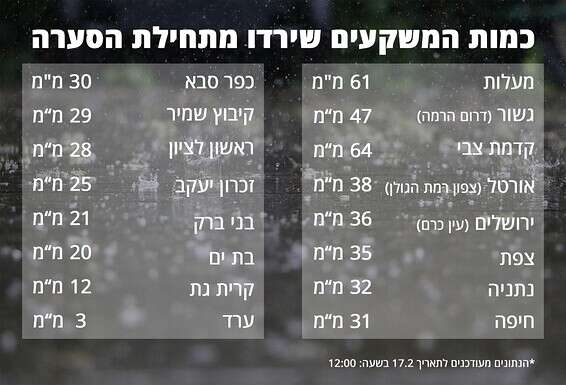
Excitement in the capital: Snow has begun to fall in Jerusalem
After the snow that started to fall last night in the Golan Heights, the cold front in our area, a result of cold air coming from Russia, was felt well this morning. It became rainy and stormy, and the snow continued to other areas in the plateau (more than 15 cm were collected in the northern Golan Heights), Safed (entrances to the city were blocked due to the danger of slipping) and the surroundings of the Merom Hagalil Regional Council.
In the morning, the first white flakes were also observed in the mountains of Samaria, and in the afternoon, light snow began to fall in Gush Etzion. In the afternoon, the snow also reached Jerusalem. The snow is expected to fall until the early morning hours of tomorrow, with another particularly cold night ahead.

The amount of rain at this stage is already quite large, when according to “Meteo Tech” data, as of 12:00 the peak of precipitation is degrees, where it fell 67 mm. In second place is Kibbutz Geshur in the southern Golan Heights with 47 mm. It should be noted that even before the current system, the precipitation situation in the north of the country and on the coastal plain was quite good and is now expected to improve even further.
Due to the snow, the following roads were blocked in the north of the country:
Road 98 Aloni HaBashan Junction to Majd Al Shams Junction.
Road 99 Saar Falls Junction to Restaurant Junction.
Road 959 Gonen Junction to Brown Junction.
Road 978 Armor Junction to Restaurant Junction.
Road 989 Saar Waterfall Junction to Majdal Shams Junction.
Road 8675 from Mahnayim Junction to the entrance junction to Amuka.
Road 9888 Bentel Junction to Merom Golan Junction.
Road 9884 Poren Junction to Avital Junction.
Road 9893 Majdal Shams Junction to Nimrod Junction.
Road 9898 Neve Ativ Junction to Majdal Shams Junction.
A snowy morning in the Golan // Photo: Adi Fiada, Aurora Latrolo
Following the storm, the Northern Command and the Judea and Samaria Division conducted a logistical and engineering operation to maintain the functional continuum of the military units serving in them. And of water, sharing tens of thousands of heating bags and hundreds of radiators and heaters.

As part of the preparation for the snows, the Home Front Command is on alert for a situation in which the forces will be required to assist the various authorities and bases. At the same time, about 150 people were rescued in Safed after being captured throughout the city and a man in his 40s was slightly injured after being hit by a tin sign flying on Balfour Street in Bat Yam.

The IEC dealt with a number of cases of weather damage to the electricity grids. Dozens of crews are working to repair torn wires due to gusts of wind and branch damage. In Rishon Lezion, a tree collapsed on power lines and tore the network. The company’s staff worked to repair the network and restore power supply to the residents of the street.

Data from the Meteorological Service before the storm show that the amounts of rain since the beginning of the season are again higher than the average in the north of the country and on the coastal plain, which have so far dropped 120% to 150% of the average for the corresponding period. In the northern coastal plain (Nahariya-Rosh Hanikra area) the cumulative amounts reach 160% to 170%, and in this area the amount has already decreased, which is similar to the perennial average for the entire season and even more. In other parts of the coastal plain, 70% to 85% of the entire season’s rains fell.
Snow in the north: The entrances to Safed were blocked
Meanwhile, against the background of the stormy weather conditions, the Nature and Parks Authority asks the public to refrain from hiking in the open field, and the hiking trails in Nahal Tavor, Nahal Yavneel, the Gilboa Reserve and the eastern Gilboa are closed. In addition, the ascent to Meron from the direction of Sde Meron School is closed due to snow. The Jewish National Fund asks the public to refrain from reaching the JNF parks and forests, for fear of natural disasters.

Participated in the preparation of the article: Shlomi Diaz, Yuri Yalon, Adi Hashmonai